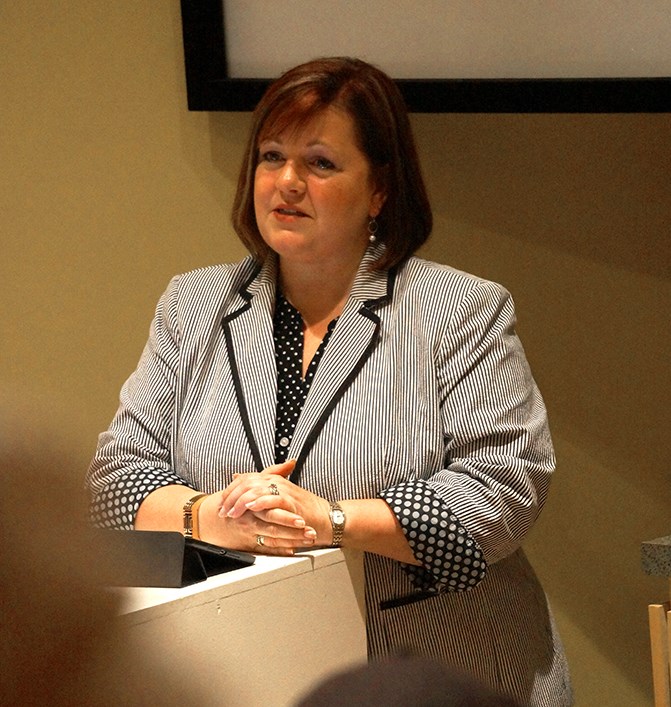If proponents are coming to town regardless of what a municipality might want, the community should get something out of it. That was the main message of visiting City of Fort St. John Mayor Lori Ackerman on Tuesday.
Ackerman spoke to a packed house at a Squamish Chamber of Commerce breakfast meeting, sponsored by Woodfibre LNG, at the Squamish Adventure Centre.
Ackerman said local governments, especially in B.C., are not at the table to make decisions on major projects.
“For us it is not a yes or no decision. We aren’t part of decision making when it comes to a proponent coming to talk to us,” she said.
What communities can do is have a strong official community plan, she said.
“It is the policy that is going to drive you forward as a community.”
“The approach that we took… Noah wasn’t in favour of the flood, but he built an arc and that is the responsibility of local government,” she said.
A strong community plan lets the proponents know what the community will and will not accept, she said.
“It gave us a foundation… that we could take to that proponent, and since then every other proponent, and say, ‘This is our community, this is where we are going and this is how you’re going to keep us on track.’”
Foundations of Fort St. John’s community plan are: economic prosperity, environmental sustainability, social inclusion and cultural diversity.
Proponents are usually fine with community demands, Ackerman said, because they want to be part of the community.
“So rather than slamming the door in their face, I have said to them, ‘You want to come in, this is how it is going to work.’”
She said if money is to be made from a project, from property taxes for example, it can be put towards community assets, such as a sports complex, a new recreation or a community foundation, as Fort St. John has done.
She said in her city’s community measures agreements are put in place, including for BC Hydro’s Site C – a dam and generating station slated for seven kilometres from Fort St. John’s downtown.
In the agreements are amenity contributions.
The Fort St. John council has also said in a community measures agreement it will accept temporary workers flying in and out only for the construction of projects, but for the operation of the facility, the workers have to live within the community, Ackerman said.
Asked by Squamish chamber director Chris Pettingill about the needs of the environment and about transitioning away from fossil fuels, Ackerman said that was something global consumers have to do first.
“When we quit relying on fossil fuels then we can start getting off them. The reality is, unless you are sitting in front of me wearing hand-woven cotton or hand-woven silk and you got here riding a hand-carved wooden bicycle, we are fossil fuel,” she said. “When we quit as consumers then there won’t be a demand… but local government can’t do that.”
Ackerman said that Fort St. John is light years ahead of other communities in terms of its community and corporate initiatives for climate action.
Hours after her talk, the provincial government authorized construction to begin on the Site C dam near Fort St. John in spite of numerous legal challenges currently underway attempting to stop the project.



